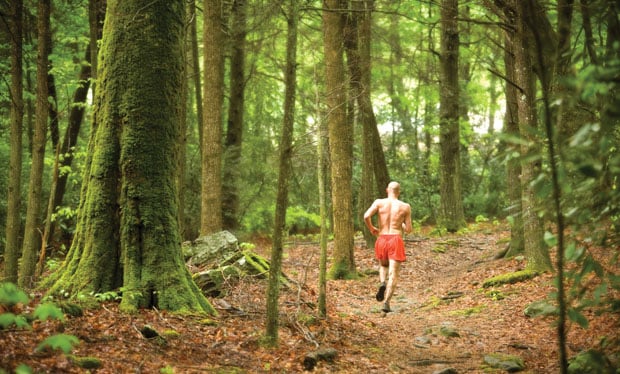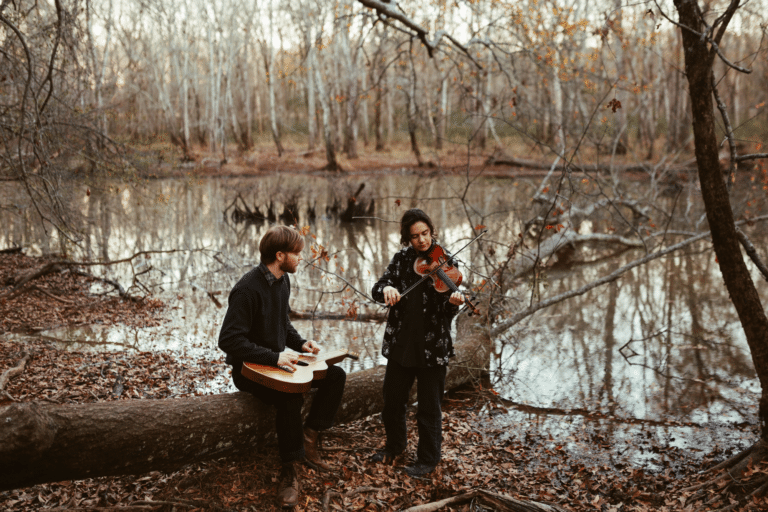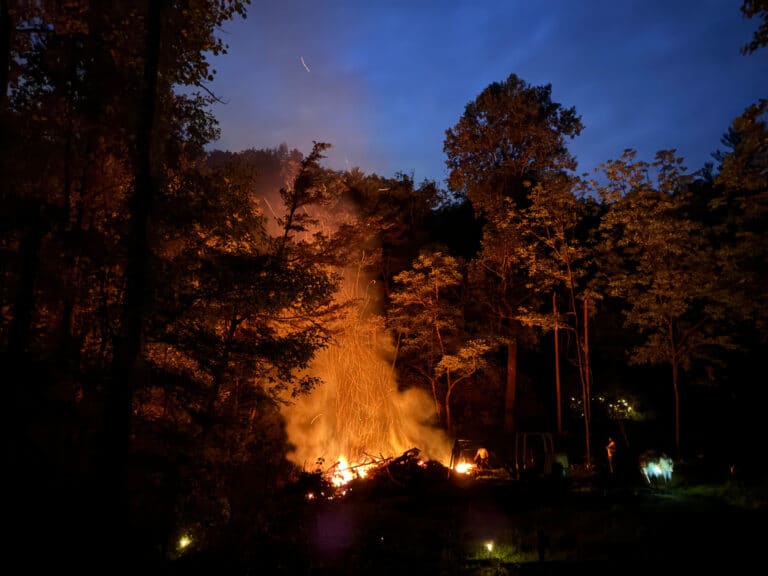Nauseated, I forced myself to swallow a few bites of soggy sandwich. The tart homemade berry jam reminded me of my son, who helped me gather the berries from our garden. His raspberry-smeared smile buoyed my spirits. I finally crested Clingmans and plunged down the mountain toward the next spring at Silers Bald, where I again had to run a half-mile off-trail to reach the spring.
The dark silhouette of Thunderhead Mountain loomed in the distance. On the rocky roller coaster trail to Thunderhead, I scrabbled up boulders, then crab-walked down a rocky ravine, only to climb sharply again up a scree-filled seam of rock. In the mid-afternoon heat, a mirage of faces appeared in my mind: my wife’s radiant smile, my son’s chubby cheeks, the warm, wrinkled eyes of my aging parents. None of these people cared if I held a speed record across the Smokies. My time mattered only to a handful of elite runners whom I rarely saw or spoke to. Why was I trying so hard to impress these people?
Finally I topped out in the grassy fields of Thunderhead. Above the tree line, the naked mountains bared their raw skeletal hues and curves. The tall, wind-dimpled sedge covered the deeply rutted trail, and twice I twisted my ankle stumbling blindly through the narrow gully.
I was parched and pummeled by the time I reached the spring at Spence Field. I was way behind my goal pace. I would need to run the final 16 miles in under two hours.
I had nothing left. My ankles throbbed. My sweaty, sunburned skin was chafed raw. My feet had been bludgeoned into swollen nubs. I sat broken-down beside the trail and untied my shoelaces.
Then I heard the fluted trill of the hermit thrush again. And it occurred to me suddenly: even though I was running solo and unsupported, I was hardly alone. With me all along were the faces of family, the memories of friends, and the footsteps of countless runners—well-heeled elite athletes and barefoot Tarahumara goat herders—with whom I had shared the trail. Even the hermit thrush, the insects buzzing around my ears, and the worms that would someday consume my flesh were part of my journey.
Perhaps it was the effects of sleep-deprivation and severe dehydration, but it seemed to me right then that the boundaries of the self are porous, and one life bleeds into another. Sure, it was the shell of my body that I was dragging across the Smokies, but the stuff inside wasn’t mine alone. It had been shaped and shared by all that I had met.
I got back on my feet.
Soon I was gliding down the spongy trail past Russell Field. My blistered, bloodied feet screamed with each step. But I had one last chance to run as fast as my legs and lungs would carry me, and that feeling was far more powerful than the pain.
I wasn’t chasing a speed record. I was chasing the kid that I would never be again. I was chasing that five-year-old boy running the neighborhood streets with dad, the fourth grader outrunning everyone on the playground, the invincible teenager lining up for his first race. I was pursuing that fading feeling of boundless, endless youth.
I chased the shadow of my former self all the way up to Doe Knob, where I was stopped in my tracks by the largest bear I’d ever seen.
The bear stared at me. I froze. Then I cast my eyes sideways. Claw marks scoured the downed trees around me. The gouged trail was pocked with craters where the bear had been digging for grubs.
For several silent minutes, we just stood there. Adrenaline coursed through my body, but I felt surprisingly steady. I could not allow myself to feel fear.
Then the bear sauntered slowly behind a laurel thicket twenty yards off-trail, still watching me. I began walking forward, singing the most soothing melody I could think of—a lullaby I had sung with my son the night before: “I’ve got peace like a river, I’ve got peace like a river, I’ve got peace like a river in my soul…”
I sang past the bear, over the knob, and down the switchbacks to the Fontana Dam finish. That peaceful river carried me all the way home.
I crossed Great Smoky Mountains National Park in 15 hours 45 minutes—a new self-supported record, and over an hour faster than I had ever run it before. But in those final miles, something more important had happened: I had stepped out of time—and my ego-driven self—to touch something far deeper. I had felt it in the pre-dawn darkness, heard it in the song of the hermit thrush, and seen it in the bear’s bottomless brown eyes. It was the presence of a wild energy far greater than myself.
Afterward, I crumpled into an exhausted pile of flesh and watched the sun melt into the mountains. I was not young anymore, and that was okay. My time in the spotlight was over. But I was still shining. And that inner light was somehow connected to the flash of fireflies illuminating the mountains.
Will Harlan’s run was dedicated to protecting clean water in Appalachia. Learn more at ilovemountains.org![]()








